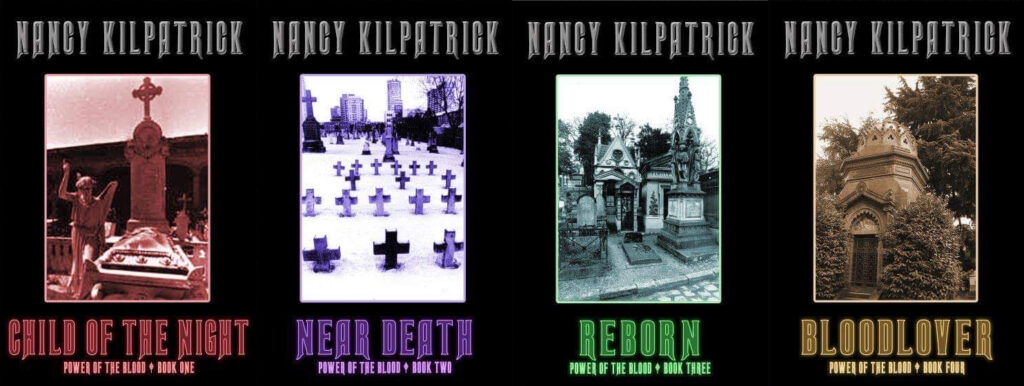Power of the Blood (Series)
Nancy Kilpatrick
Crossroad Press, 2020 (revised and updated)
Reviewed by Elaine Pascale
If I could attribute the Power of the Blood series to a philosophical theory, it would be existentialism. Woven through the four books is the theme of questioning life and death, and which of the two states is preferable. Like many vampire* characters, the supernatural beings of the series fear and abhor ennui more than death or the violent circumstances that might produce that state.
The series begins with Child of the Night, in which the main character Carol pays a visit to Bordeaux alone. She is newly single and facing a reality (and health issues) she had not anticipated. The book starts with a bang, as Carol is basically accosted in a bar by a very creepy man named Andre. Readers can relate: you want to be alone with your thoughts but not necessarily physically isolated, so you go to a bar or park, and some asshat selects that time to practice his pickup lines. Carol’s experience differs from most of ours (maybe?) in that the harasser is not exactly human.
Through some unexpected twists and turns, Carol agrees to spend two weeks with Andre in a match of wills. In his home, she meets others like him: Gerlinde, Chloe, Karl, Julien, and Jeannette, among others. They are a unique and interesting bunch and, while they care about Andre, they seem to recognize his deadlier issues. Despite being unsafe with Andre, Carol feels a connection to him and an inability to completely sever their relationship (spoiler alert: it lasts longer than two weeks).
The second book in the series, Near Death, tells the story of Zero (birthname: Kathy) who is visiting England as a hitman. Unlike Carol’s situation, this one may not be as familiar to most readers: agreeing to kill in order to feed a heroin addiction (and nobly to protect her missing brother). Zero has been dispatched to put a stake in heart of David, a vampire-like creature who originally died in the 1800s. David is a poet and in the beginning of the story is opposed to violence and killing. Circumstances with Zero cause him to question his ethical stance and the quest for revenge begins to consume him. David is friends with Andre and Karl from Child of the Night, and the plot brings the familiar characters back together.
Book 3, Reborn, mixes a “detective novel” type scenario into the existential horror formula with sound results. I don’t want to mention too much about the characters in this offering or else I may be providing spoilers for readers who want to tackle the series in order. I really enjoyed how Reborn opened, with a creepy mausoleum setting followed by a scary incident that requires the knowledge of folks who have lived for over a century (or longer) to solve. This book also provides more of a backstory about Karl and Gerlinde.
Reborn is probably the most existential of the series, as it questions the aspect of a suicide desire, or a moment when immortality seems meaningless. Kilpatrick plays with the contrast between young and old characters (literally and figuratively as some characters are “young” to the concept of being a vampire while being well into adulthood). This desire to “end it all” is seen in the risky relationships of each book in the series. As the stories tell of newly developing relationships, there is a loneliness and lack of trust that can only be extinguished when one truly knows another and is known in the same way. The vampires, while having lived centuries, are still coming to understand themselves and how they relate to others.
Book 4, Blood Lover, focuses on Julien and Jeanette. Readers find that life, even with love, can remain lonely. Trust is an issue and neither Julien nor Jeanette is truly trustworthy. Blood Lover felt the most like a stand-alone book, as there was less intermingling/mention of characters from other books in the series.
While each book in the series is enjoyable on its own, I enjoyed reading them in order. I sensed a progression that way and came to understand the characters more deeply. The series includes charming tales of mid-20th century Europe, along with some interesting historical fiction set further in the past. Kilpatrick is well-traveled, and she provides detailed and exquisite images of quaint villages and romantic landscapes. The tales move effortlessly from old-world Europe, to Montreal, to the seedy, yet glitzy, underbelly of New York City.
As with many of Kilpatrick’s other works, Power of Blood contains graphic sex scenes that might not be suitable for all audiences. While the series has been updated, there was a nostalgic feel in terms of issues discussed and clothing described that reminded me of some of my favorite vampire films.
I highly recommend the series. Social distancing has provided wonderful opportunities to engage in additional reading and this series should be added to the summer reading list.
*I am referring to the characters in the books as vampires as they need to consume blood to live, can be burned to death by the sun, and live impossibly long lives. The characters, however, do not appreciate this term…









